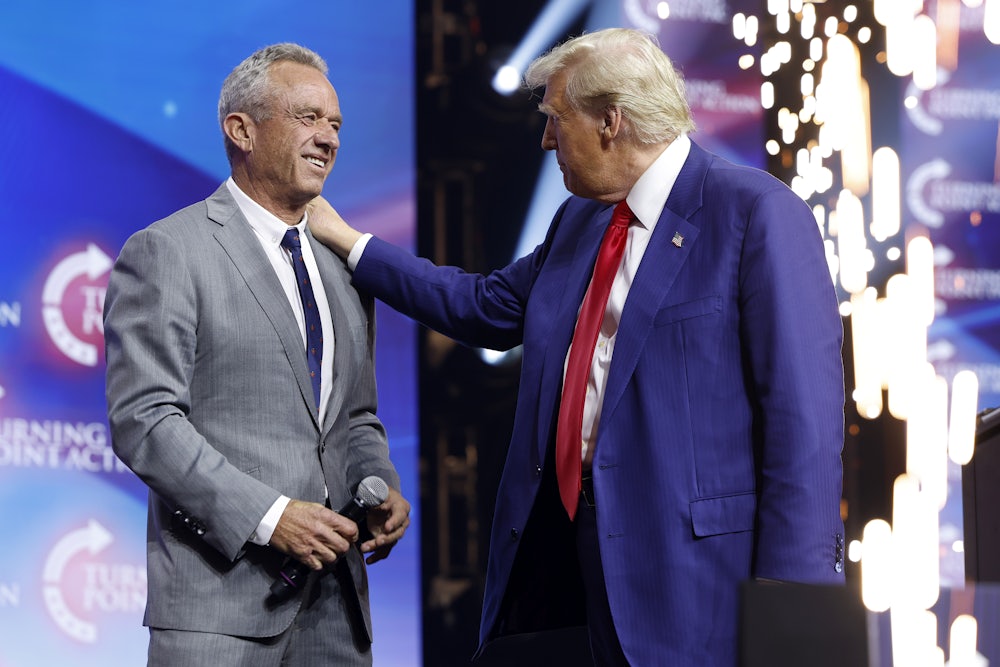Last month, an E. coli outbreak swept through McDonald’s restaurants in 13 states, killing one person and sickening 89 others, including 27 people who needed to be hospitalized. Within days, an investigation led by the U.S. Centers for Disease Control and Prevention identified the culprit—fresh, slivered onions often served on Quarter Pounders—and they were able to halt the outbreak.
Under a second Trump administration, it’s not clear that public health officials would be able to act so quickly. In the wake of Trump’s victory, conservative commentators, including right-wing podcaster Matt Walsh and former Trump strategist Steve Bannon, emphasized that Project 2025, which calls for splitting up the CDC and erasing protections on health care, “is the agenda.” Meanwhile, close Trump ally Robert Kennedy Jr., who claims Trump promised him control of health and agriculture agencies, told MSNBC last week he plans to empty entire departments at agencies like the U.S. Food and Drug Administration, which regulates the food and drug supply.
Over the next two months, health officials are racing to “Trump-proof” their work, said Gregg Gonsalves, associate professor of epidemiology at Yale School of Public Health. Federal officials are scrambling to disburse funding and move up the timelines of some projects, while local and state health departments are trying to beef up any potential weaknesses in their systems.
Without quick, coordinated responses to outbreaks of deadly pathogens like E. coli, “you’ll see more of them,” Gonsalves told me. Lindsay Wiley, professor and director of the Health Law and Policy Program at UCLA Law, agreed: “Conducting investigations really requires work across state lines—we really are pretty dependent on federal agencies to perform those kinds of epidemiological investigations to track it to the source,” she said. “State and local health departments should be scanning to identify: What are the things that we would lose?” That could include funding as well as resources and leadership on epidemiological investigations and health campaigns. It’s not unusual for states to share resources and information among themselves, but multistate efforts are usually coordinated by federal officials. Now states are rushing to fill in those gaps.
The national public health apparatus won’t be dismantled overnight—it’s too complicated for that, Gonsalves said. “This is where federalism is a blessing.” Instead, it’ll be a war of attrition, he said, and while larger local and state health departments with more resources may be better able to weather the coming storm, everyone will face significant challenges. Public health, always operating on a shoestring budget, is in worse shape than it was before Covid hit, with fewer resources and less trust alongside more pathogens, pervasive burnout, and threats to personal safety.
Trump said last week that he hasn’t ruled out banning certain vaccines at RFK Jr.’s prompting, though Kennedy later walked back the claim slightly by saying he “won’t take away anybody’s vaccines.” Not much can be done to prepare for the possibility of removing vaccines from the market, because mounting an effective vaccination campaign to prepare for future shortages isn’t likely to happen in the next two months—though communications on getting up-to-date on immunizations could help. “Most local and state health departments don’t have funding sloshing around to mount any kind of last-minute … efforts like this,” Gonsalves said. While state and local health departments have always been on the front lines and vaccination campaigns happen at the local and state level, the funding largely comes from the federal government, he said. And “anything that needs national leadership and coordination is going to be severely disrupted or dismantled.”
Before Trump’s administration takes office in January, federal officials need to send out funds already appropriated by Congress to state and local health departments, a process that often takes months or years, experts said. “The most important job for them to keep doing, and maybe to prioritize in this moment, is getting money out the door,” Wiley said. Public health programs could be cut off in future budgets, Wiley said, “but there’s also the possibility of a lawless decision to just not make the payment, even though it’s been appropriated.” Wiley was careful not to name specific programs, in case that makes it easier for Trump administration officials to target them, but she said public health usually depends on federal money for everything from disease monitoring to maternal mortality prevention.
“Whatever discretionary funding is around, get it out the door if you’re CDC; if you’re a state health department or local health department, spend that money,” Gonsalves said. “But the big thing is that state and local officials may have to step into the breach now and support basic public health capacity that they have not had to do in the past.”
To the extent they can, some state and local officials have already been preparing for disruption. “States that are pro-health or protective of public health have been taking action to try to protect and shield health professionals,” Wiley said. Usually, state health departments operate without much direct federal intervention. “The new thing is going to be the absence of a federal buffer with respect to other states,” Wiley said. The Biden administration has been using tools like the Food and Drug Administration approval of certain drugs and the Emergency Medical Treatment and Labor Act, or EMTALA, to protect providers from state restrictions on abortion, she said. “That shield from the federal government will go away. But in the meantime, states have also tried to supplement that federal buffer with a combination of things that count as shield laws.”
Shield laws can be especially important with “politicized forms of health care that have mainstream scientific support and are evidence-based but have been politicized by opponents, sometimes based on misinformation,” Wiley said. This includes reproductive, sexual, and gender-affirming health care; mental health and vaccination could also come under attack from anti-science officials, she said. In addition to making laws to protect health professionals who provide care for people living in states where that care is restricted, officials are also making sure they don’t have any laws on the books that could be turned against providers.
State and local officials may also be preparing for revenge from the incoming president—especially states where elected officials might actively resist complying with what they view as unlawful commands of a new federal administration, or even states that simply didn’t turn red for Trump on election night. In 2018, Trump attempted to withhold wildfire disaster funding to California because of the number of Democratic voters in the state.
The reality is, most people don’t really understand what public health does. The pandemic increased that sense of uncertainty and misunderstanding, Gonsalves said. “It’s not masking and vaccine mandates. It’s the fact that you don’t get food poisoning when you walk into a restaurant, the water coming out of your tap isn’t filled with lead, your building tiles aren’t filled with asbestos, you don’t have to deal with polio or other childhood infectious diseases.” In order to save public health, we need to understand the countless and almost entirely invisible ways it saves our lives every day.
“Go to city council meetings, support pro–public health candidates, write op-eds, counterprotest if necessary,” Gonsalves said. To fight against tyranny, “you get ready to defend institutions.” That means finding out who runs public health in your city or town, finding out what they need, and supporting them. “If there’s a city council meeting and they’re talking about your local health department budget, make sure you’re there to advocate for it,” he said. And he’s not just talking to residents of red states or scrappy little towns, which may already face significant challenges. Larger departments and blue districts that expanded their work with Covid funding have had to cut back, but they may be motivated to find ways to continue these efforts if residents indicate they’re important. “This is all hands on deck,” Gonsalves said. “You need to show up everywhere … everything is in jeopardy.”
Anti-science proponents have gotten very good at showing up, consistently, at all levels of leadership and making their voices heard in public meetings and private communication. Those eager to defend public health institutions may need to start following a similar playbook.
Above all, “we’re not helpless,” Gonsalves said. “This isn’t the first time at the rodeo for anybody in public health.” Gonsalves got his start in public health activism during the earliest days of the HIV/AIDS pandemic, when Ronald Reagan’s inaction and incompetence made the tragedy far worse; Gonsalves also lived in South Africa when then-President Thabo Mbeki blocked lifesaving HIV antivirals. Those were difficult days, in which tempestuous leaders made things a lot harder, but now “they are gone,” Gonsalves said. “These tin-pot dictators like Donald Trump are a dime a dozen, and they come and go. But we keep pushing ahead.”






